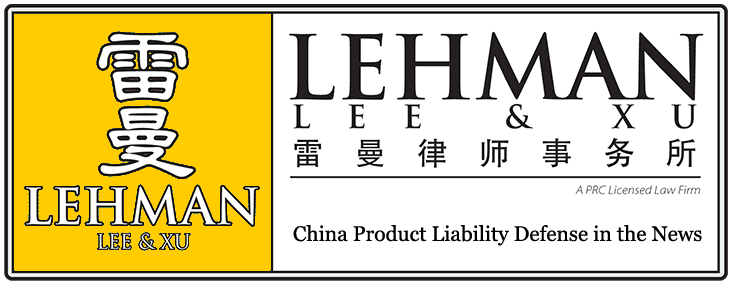

 |
|
LEHMAN, LEE & XU China Lawyer
|
|
China Product Liability Defense In The News
|
|
April 2014
|
The China Law News keeps you on top of business, economic and political events in the China. |
|
|
|
In the News |
P&M: ICBC adopts stricter rules on trust products |
Industrial and Commercial Bank of China has stepped up its scrutiny of third-party trust investments, in a sign that Chinese banks are becoming more prudent in selling wealth management products after recent defaults in the sector. Since China Credit Trust’s Rmb 3bn (US$484m) Credit Equals Gold #1 failed to repay investors as planned in January, ICBC has required private bankers to gain approval from a credit committee within the commercial bank before offering trust products to clients, according to a source at ICBC. The additional layer of approval was not needed before the incident, and suggests that China’s biggest lender has concerns over its own liability towards trust investors. Companies such as China Credit Trust operate independently of the banks, and any loans made through their trust vehicles do not appear on banks’ balance sheets. Lenders such as ICBC, however, play a key role in distributing the products, and are the first port of call for wealthy individuals demanding their money back. ICBC had marketed Credit Equals Gold, which ran into trouble after lending the proceeds to an indebted Shanxi coal miner, and investors had protested in front of ICBC branches until an unnamed investor stepped in. After the last-minute bailout, holders of that product were set to receive their principal, but not the final interest payment, according to local media reports. Credit committees at the bank are now expected to assess the viability of underlying projects to which the trust is lending, as well as the tenor of the loans and whether the return is sufficient for the risk, the person said. Before, private bankers at ICBC could source third-party trust products and sell them directly to their high-net-worth clients, the ICBC source said. The bank did not require additional credit approval because the products were deemed to be of little risk as there were no precedents of default, the source noted. ICBC declined to comment. A banking analyst from an auditing firm confirmed the new policy at ICBC. More defaults Analysts are expecting further defaults in China’s Rmb 10 trillion trust sector as the country’s economy slows and more companies struggle to meet their obligations. An unprecedented default on a domestic corporate bond in early March has also removed the perception that regulators will always step in to ensure investors are repaid. In February, Songhua River #77 Opulent Blessing Project, structured by Jilin Trust and sold by China Construction Bank, failed to repay a large portion of the Rmb 973 million principal, according to state media reports. Like Credit Equals Gold, the Opulent Blessing trust product had invested in a loan to a Shanxi coal miner, and was left short of funds when the mining company defaulted. “It’s not surprising that banks are reviewing their policy over distribution of third-party trust products after the recent defaults,” said Qiang Liao, a banking analyst at S&P in Beijing. Local media reported earlier this week that ICBC and China Construction Bank had stopped selling trust products. The source at ICBC said they will continue to offer such investments to their clients, but only after they have been vetted internally. “It is a trend that banks are taking measures to address the problem [of trust product distribution],” a credit analyst at Shenyin Wanguo Securities said. Shadow banking A private banker at one of the big four state-owned banks said it would be hard for banks to stop completely, but agreed that tougher controls were needed. “Banks will be more cautious in introducing trust products they distribute,” the private banker said. In an attempt to contain risks, the Chinese regulators in recent months have set up fresh rules for trust products and the shadow banking industry. The rules require financial institutions to clarify who bears which risks and liabilities in trust investments. It also demands matching the source of funds to a particular underlying project. Banks will also need to set up separate wealth management arms to avoid risk transmission between their commercial banking and wealth management business. “The government’s intention is make the shadow banking industry more transparent and to reduce banks’ dependence on wealth management products,” said Cornish. “But the rules haven’t been stringently enforced and whether they will eventually reduce risk in the banking system is yet to be seen.” http://www.ifrasia.com/pm-icbc-adopts-stricter-rules-on-trust-products/21138182.article |
|
|
|
|
| Proud Member of |